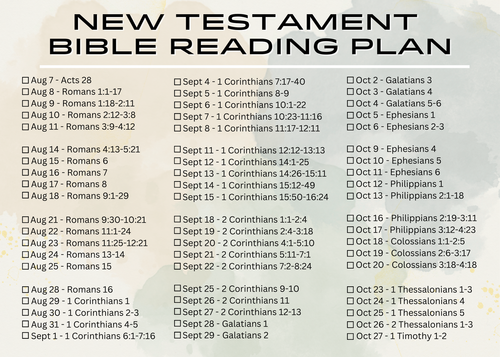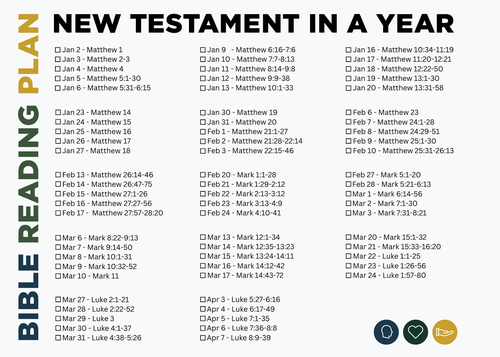The Resurrection And Resurrection Bodies
1 Corinthians 15:12-49
It is utterly illogical for certain Corinthians to deny the resurrection of believers by God. If God does not resurrect the deceased, Christ has not been raised. The consequences of such a denial are significant:
If God does not bring the dead back to life, then the actions of some individuals would be absurd. However, since God does indeed raise the dead, the claims made by some Corinthians are also absurd. It is nonsensical for people to be baptized on behalf of the deceased. It is also irrational for Paul and his co-workers to constantly face danger (vv. 30-32). When Paul says, "I die every day!" (1 Cor. 15:31), he is not using a metaphor to mean that he dies to himself. He is expressing that his life is consistently at risk. The mention of "beasts at Ephesus" likely metaphorically refers to people in Ephesus who opposed Paul and contributed to his physical hardships.
Since those who deny the resurrection of the dead are negative influences that corrupt one's character, the Corinthians must not allow such individuals to have a detrimental impact on them. Paul urges those who deny the resurrection and those considering their arguments to wake up. They must stop sinning by spreading or tolerating false teachings about the resurrection. The Corinthians value their knowledge, but those who deny the resurrection lack a fundamental understanding of God's power to resurrect the bodies of believers.
"So, how exactly are corpses raised? What kind of physical body will corpses supposedly have?" Paul uses an analogy to explain this concept. Like seeds in nature, which go through a life-through-death process, it is reasonable to believe that believers' corpses will also transform. Initially, believers have earthly bodies, but later on, God will transform them into heavenly bodies. If God designs his creations to thrive in their respective environments, it is reasonable to assume that he will prepare the resurrected corpses of believers to flourish in his future "kingdom."
Different types of bodies exist for humans, domesticated animals, birds, and fish. Likewise, our future heavenly bodies will be different from our current earthly bodies. Not only are heavenly and earthly bodies different, but their "glory" also differs. The "glory" of something refers to its unique excellence, magnificence, or grandeur. The glories or radiances of the sun, moon, and stars are distinct. The body buried is the earthly body, while the raised body is the heavenly body.
If a physical body is sown, there must also be a superior corresponding body. The physical body is earthly, while the spiritual body is heavenly. Adam's natural body came first, followed by the supernatural body of the resurrected Christ. Later still, those who belong to Christ will have heavenly bodies.
Adam's natural body is "from the earth" - a man made from dust. Therefore, Christ's spiritual body is "from heaven" and is heavenly. Earthly people are like Adam, the "man of dust," while heavenly people are like Christ, the "man of heaven." Since we know that we will receive heavenly bodies in the future, we should strive to be like Jesus now while in our earthly bodies.
- The apostles' preaching would be in vain.
- The Corinthians' faith would be in vain.
- The apostles would be misrepresenting God.
- The Corinthians' belief would be futile.
- The Corinthians would still be in their sins.
- Believers who have died would have perished.
- Believers would be the most pitied if their hope in Christ is limited to this earthly life.
If God does not bring the dead back to life, then the actions of some individuals would be absurd. However, since God does indeed raise the dead, the claims made by some Corinthians are also absurd. It is nonsensical for people to be baptized on behalf of the deceased. It is also irrational for Paul and his co-workers to constantly face danger (vv. 30-32). When Paul says, "I die every day!" (1 Cor. 15:31), he is not using a metaphor to mean that he dies to himself. He is expressing that his life is consistently at risk. The mention of "beasts at Ephesus" likely metaphorically refers to people in Ephesus who opposed Paul and contributed to his physical hardships.
Since those who deny the resurrection of the dead are negative influences that corrupt one's character, the Corinthians must not allow such individuals to have a detrimental impact on them. Paul urges those who deny the resurrection and those considering their arguments to wake up. They must stop sinning by spreading or tolerating false teachings about the resurrection. The Corinthians value their knowledge, but those who deny the resurrection lack a fundamental understanding of God's power to resurrect the bodies of believers.
"So, how exactly are corpses raised? What kind of physical body will corpses supposedly have?" Paul uses an analogy to explain this concept. Like seeds in nature, which go through a life-through-death process, it is reasonable to believe that believers' corpses will also transform. Initially, believers have earthly bodies, but later on, God will transform them into heavenly bodies. If God designs his creations to thrive in their respective environments, it is reasonable to assume that he will prepare the resurrected corpses of believers to flourish in his future "kingdom."
Different types of bodies exist for humans, domesticated animals, birds, and fish. Likewise, our future heavenly bodies will be different from our current earthly bodies. Not only are heavenly and earthly bodies different, but their "glory" also differs. The "glory" of something refers to its unique excellence, magnificence, or grandeur. The glories or radiances of the sun, moon, and stars are distinct. The body buried is the earthly body, while the raised body is the heavenly body.
If a physical body is sown, there must also be a superior corresponding body. The physical body is earthly, while the spiritual body is heavenly. Adam's natural body came first, followed by the supernatural body of the resurrected Christ. Later still, those who belong to Christ will have heavenly bodies.
Adam's natural body is "from the earth" - a man made from dust. Therefore, Christ's spiritual body is "from heaven" and is heavenly. Earthly people are like Adam, the "man of dust," while heavenly people are like Christ, the "man of heaven." Since we know that we will receive heavenly bodies in the future, we should strive to be like Jesus now while in our earthly bodies.





Recent
Archive
2023
January
Happy New Year!He Will Save His People From Their SinsMy Beloved SonTemptation And MinistryThe SermonLeaving, Lying, Limits, Love, Largesse, and The Lord's PrayerTreasure, Anxiety, and JudgmentAstonishing AuthorityStorms, Demons, and HealingJesus Is CompassionateHis Eye Is On The SparrowSwords, Rewards, and MessengersThe Lord of the SabbathBlasphemy, Bad Trees, Signs, and FamilyStories, Sowers, and SoilsParables, Hidden Treasure, and RejectionFame, Food, Fear, Faith, and FringeReal Issues And The Power Of GodDying To Find LifeLike The SunChildren, Temptation, Sheep, And ForgivenessMarriage, Kids, And MoneyTo Serve And Give His Life
February
The ArrivalStories That StingQuestion TrapsHidden Motives And LamentThe End...?UnexpectedReady?Punishment, The Plot, And PerfumeTreachery, Passover, and The CupBetrayal, Injustice, And DenialThe Field Of Blood And The GovernorCrucifixion And DeathAll AuthorityMark—The Beginning Of The GospelHealing, Preaching, And The Forgiveness Of SinEating With Tax Collectors, Fasting, The Sabbath, And An Escape BoatThe Twelve, Blasphemy, Family, And A ParableParables And PowerA Different Kind Of StormPower Had Gone Out
March
Death, Hunger, And MiraclesCommandment Or TraditionDo You Not Yet Understand?The Christ And A Glimpse Of His GloryUnbelief, Confusion, And SinDivorce, Children, And PossessionsTo Give His Life As A RansomHosannaThe Rejected Stone, Taxes, And The Great CommandmentDestruction And The EndNo One Knows, An Anointing, And A Promise To BetrayPassover And GethsemaneThe Kiss, Arrest, And DenialPilate, Simon, And The CrucifixionDeath, Burial, Resurrection, And What\'s NextTheophilus And A Visit From GabrielMary And The MagnificatBenedictusThe Arrival And The ShepherdsSimeon, Anna, And The SpiritFruits Keeping With Repentance And BaptismThe Wilderness, Nazareth, And CapernaumSimon's Mother-In-Law, Fishing, A Leper, And Sins
April
Tax Collectors, Fasting, Sabbath Controversies, And The TwelveWhy Do You Call Me Lord, Lord?Jesus Marveled, A Raised Son, And QuestionsA Sinful Woman And A ParableObeying The Word, A Storm, And DemonsTwelve Years, Twelve Apostles, And SpeculationGreater, Costly, And GloryNot Getting It, The Cost, And AppointedWoes, Neighbors, And What Is NecessaryHelp Us Pray And A Divided Kingdom?Signs, Lights, And WoesHypocrisy, Fear, A Fool, And AnxietyParables, Division, And The TimesWarnings, A Daughter Of Abraham, And Jerusalem, JerusalemA Son Or An Ox, Parties, And DiscipleshipLost ThingsThe Dishonest Manager, The Law, And Anguish In This FlameMillstones And Mustard SeedsPersistent Prayer, Humility, A Childlike Faith, And The Rich RulerEverything That Is Written, A Blind Beggar, And A Wee Little Man
May
A Parable, A Colt, A Prophecy, And A CleansingAuthority, Wicked Tenants, And TaxesThings To Beware Of And WidowsDestruction, Persecution, The Son Of Man, And WatchingThe Plot, Betrayal, Lord's Supper, And Inappropriate BehaviorPrediction, Fulfillment, Agony, Betrayal, And DenialMistreated, Taken Before The Council, Pilate, Herod, And Delivered To Be CrucifiedCrucifixion, Death, And BurialHe Is Not HereDisbelieved For JoyIn The Beginning…The Lamb Of God And A WeddingZeal, What's Inside, And Born AgainHe Must Increase
Categories
no categories
Tags
no tags
